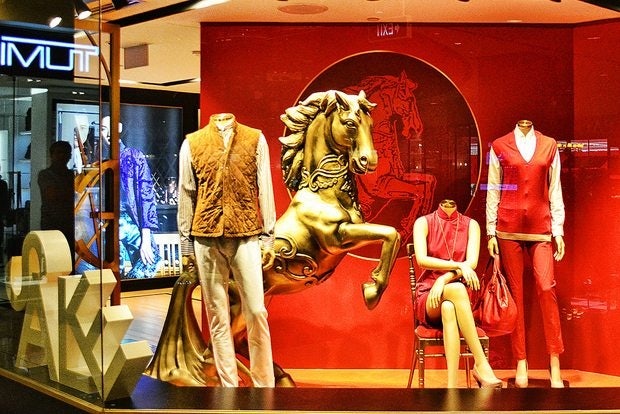
Shanghai Tang is an internationally-acclaimed luxury Chinese brand, but a researcher says that other than that, there's no other Chinese luxury brands. (Flickr/Choo Yut Shing)
Establishing a luxury brand is a complicated business, requiring not only just capital but also know-how. Chinese consumers have been touted as the world’s largest luxury spenders, yet China has few famous luxury brands of its own. In a recent Chinese article which claims that other than Shanghai Tang, China has “no luxury brands”—which isn’t necessarily true if you count companies such as Hong Kong’s Qeelin or Shanghai’s Shang Xia—University of International Business and Economics (对外经济贸易大学) luxury researcher Zhou Yun discusses with finance and investment magazine Capital (投资与合作) what luxury businesses in China can do to compete with top global brands.
What paths has China taken in creating luxury brands?
Chinese culture manifests itself in two ways: one is in food, the other is in clothes. The pioneers of Chinese luxury are the “Time-honored Brands” [an official title given by China’s Ministry of Commerce] of the catering industry, such as Donglaishun and Quanjude. We wanted to make these Time-honored Brands famous, and realized that Chinese cuisine has standing in the international scene—the top three dishes in the world come from us. The strength of Time-honored Bands is that they have long-standing histories, and to be a luxury brand, one needs exactly that. But it is hard to standardize quantity and quality in the food and beverage industry, thus it has limited expansion potential.
Furthermore, it’s hard to translate the quintessence of a Time-honored Brand—for example, how do you translate what’s quintessential about Quanjude? If you’re unable to translate even the name of a brand well into English, becoming a luxury brand will be hard. Furthermore, our culture is not resilient enough, causing us to abandon our own culture in favor of others. Most of our favorite brands are foreign; how will our own brands ever compete?
According to you, it is an uphill task for the catering industry to break into the international scene. What about the fashion industry?
I think that the high-quality, limited-quantity fashion industry is most likely to become luxury. China is the most competitive market for foreign countries. Twenty-five percent of all clothing by foreign brands is made in China. Although China has experienced a recent break in our culture from historical to present times, causing us to have lost a lot of our traditional culture, but in recent years we’ve been picking them back up, especially in high fashion. We have retained the foundations of our traditional clothing, and retrieving any culture lost in that is especially easy.
What is worth nothing is that when we insert Chinese motifs into our fashion, that is something not imitable by foreigners. It’s easy to gain short-term core competitiveness by upping one’s skills, but maintaining that competitive edge is hard.
Things that are easily imitable will be quickly taken by others. If you use foreign brand names to build Chinese products, then it ends up being us copying them. They can “extinguish” us at will, because their culture is evolving, and we must react accordingly, reaffirm what our culture is, and only then will we endure. Fashion is where we are most able to present our traditional culture and confidence. If we’re able to make an exquisite product of it, I’m sure we’ll be able to create an enduring Chinese luxury product.
What can we do to break into the market?
A good attitude and understanding of what urgently needs to be addressed is important. The role of luxury in our local industries is not great—we do not find the urge to create a few pieces of exquisite, exclusive luxury products that a company’s revenue is heavily dependent on. We need to find out what we want to do with luxury, and not copy what other countries are doing with it, because what works for one place might not work for another. As a result, some Chinese companies aspiring to become luxury might feel like they are contained in a bubble. Foreign luxury brands might be a pressure against us, but that’s what they need to be doing, and success cannot be achieved in a day or two. We should not cave in because of these circumstances, but should remain focused on the goal of becoming luxury.
In addition to having a good attitude, we must not forget the initial motivations behind wanting to be luxury, and these have to go hand-in-hand. Our battle strategy should be a give and take—inviting foreign brands in, while sending our own into the global scene. However, it should not be a “rush out” method, but rather, to have others invite us over. Even if one rushes out with a thick skin and a wad of cash, one isn’t necessarily making it on the international scene. To have truly made it globally, we must first invite other brands in to let them see that we have a lot to offer. They’ll then return to tell others of China’s bounty, whereby they’ll then have the desire to invite our brands over.
What do you think of China’s current environment for building luxury brands?
I have a lot of confidence, but I cannot ignore that we have a lot of shortcomings. One of our biggest limitations is a lack of a long-standing, established brand. For something to become luxury, just a product on an assembly process isn’t enough. It has to be result of one’s craft, to the point where one is almost unwilling to sell it. Just like in gifting, if it doesn’t pain you to give it away, it becomes less valuable in others’ eyes. We can’t just buy the blood and sweat of craftsmen and designers as they produce a unique, quality product. These things have to be groomed, and they take time. We still have a long way to go, and patience is key to achieving our luxury goals.